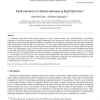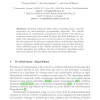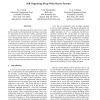139 search results - page 7 / 28 » How Common Can Be Universality for Cellular Automata |
DATE
2006
IEEE
14 years 1 months ago
2006
IEEE
— In this paper, we present a test generation framework for testing of quantum cellular automata (QCA) circuits. QCA is a nanotechnology that has attracted significant recent at...
CEC
2007
IEEE
14 years 2 months ago
2007
IEEE
— Cellular Automata (CAs) have been investigated extensively as abstract models of the distributed systems composed of autonomous entities characterized by local interaction. How...
JCSS
2008
13 years 7 months ago
2008
A commonly used model for fault-tolerant computation is that of cellular automata. The essential difficulty of fault-tolerant computation is present in the special case of simply ...
UPP
2004
Springer
14 years 1 months ago
2004
Springer
Evolving solutions rather than computing them certainly represents an unconventional programming approach. The general methodology of evolutionary computation has already been know...
SASO
2008
IEEE
14 years 2 months ago
2008
IEEE
We propose a self-organizing sleep-wake sensor system that is scalable, easily implemented, and energy conserving. An application of concepts from cellular automata theory account...



